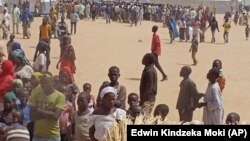The number of refugees fleeing the Boko Haram insurgency from Nigeria to Cameroon has stabilized in the past month. But thousands of refugees who preferred living with Cameroonian host families and relatives have been streaming into the Nigerian refugee camp at Minawao, northern Cameroon due to hardship. Their numbers have increased from 30,000 to close to 45,000, U.N. agencies report.
At the Minawao refugee camp there have also been skirmishes over food and water between the refugees and host communities in surrounding villages.
Elementary students at the government primary school in Minawao are having interactive lessons with their teacher, Gadsia Rudolph, himself a refugee from Gambarou in Nigeria's Borno state. Rudolph said for more than a month, classes have not been disturbed by an influx of refugee children.
"The teaching now is moving successfully, there is no problem because we are always with the children. If they say they have any problems we explain and there is no problem,” Rudolph said. “Now I am teaching class one mathematics, sounds, English and words."
Miracle Safu, an eight-year-old refugee from Gwoza in Borno state said they are having their needs met, even at school. "We are very happy, we have food, we have water, we have everything we say thank you," stated Safu.
Isaac Luka, president of Nigerian refugees at the camp, said for nearly two months there has not been an influx of new arrivals from Nigeria, but that many refugees who preferred to stay with friends and relatives have been rushing to the camp due to hardship. He said they expect to find better living conditions in the camp.
"The conditions of the refugees is getting shape now compared to two months back. You know we were complaining of water and whatever. It was due to the increase of refugees everyday, but I think by the grace of God things are [now] moving very good," Luka said.
Conditions are getting better because United Nations agencies, the government of Cameroon and international non-governmental organizations have been contributing food and basic supplies for the refugees. This week, the international organization Plan Cameroon and Irish Aid contributed $160,000 toward basic needs.
Powell Tchatat, plan coordinator for northern Cameroon, told VOA they were responding to calls made by U.N. refugee chief Antonio Guterres for the world to help the refugees who were on a brink of a humanitarian crisis.
"It is a contribution which has been decided based on the need assessment that was conducted in the Minawao camp by the UNHCR and international NGOs. So Plan Cameroon received this contribution from Irish Aid and the non-food items that are being distributed today are made up of blankets, you have multipurpose tanks, you have jerrycans, kitchen sets, you have mosquito nets, you have soaps and plastics," stated Tchatat.
Yaouba Ngomna, a leader of Gadala village that shares a boundary with the Minawao refugee camp, said he is not happy because his people, who received the refugees have exhausted all they have for their well-being, are not considered when food aid and humanitarian assistance is distributed.
He said he and his people should not lack food to eat, water to drink and access to schools and hospitals while strangers in their land are provided with everything they need. He said they shared the little food they had with the strangers and should not stay hungry now while the people they have been helping have all they need.
Tchatat said they are also preparing to assist host communities. "The approach is to combine the needs of the refugees, the needs of the host communities and also to address the issue of the internally displaced people,” he explained. “We thought that it will be good to construct boreholes for the refugees, but also to give the opportunity to the host communities to compensate the loss, to manage the pressure that they have been suffering due to this influx of refugees."
The government of Cameroon and UNHCR say the number of refugees has increased to about 45,000, but most of them are those leaving host communities in Cameroon for the refugee camp as a result of hardship.
Early this month, Cameroonians internally displaced by the Boko Haram insurgency complained that they were living in desperate conditions, going without food, water and medicine for days at a time.









